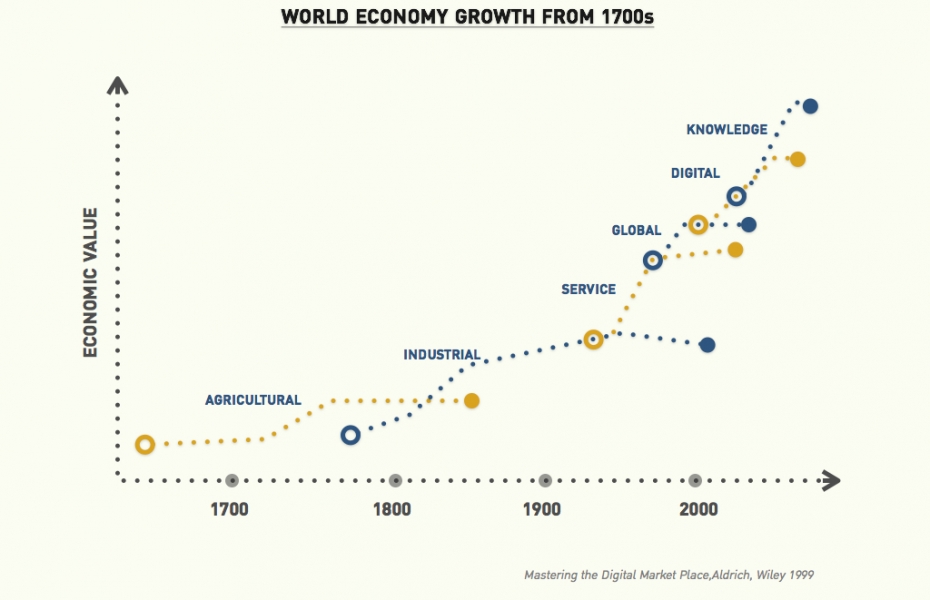FROM AGRICULTURAL ECONOMY TO ATTENTION ECONOMY

BY DR. TANAI CHARINSARN
July 19, 2016
Business Development... Learn from the past... before studying the future...
Business managers often ask questions like, "Which business will profit us tomorrow?" and "How can we increase our business revenue?" If we have tried to study the economic evolution from history, many times we can predict or estimate the future situation. Understanding the natural course of events and the environment at that time will help us see the learning process and find opportunities to outperform competitors. Changes in the business environment are influenced by different eras and circumstances. This is what helps us assess the direction to make money for our business more easily.
Learn from the past... How does the history of the economy say it is?

AGRICULTURE ECONOMY (<1800S)
Going back to the time when prosperity didn't change rapidly as it does today, human needs were basic, consisting of food and shelter. People chose to settle near water sources, focusing on agriculture, farming, and cultivation. With the rapid population growth during that era, this drove significant growth in businesses related to food and consumption.
During this period, those engaged in agriculture were considered the wealthiest group, and prosperity was concentrated near water sources. We can see the cultural prosperity in various river valleys like the Nile, the Tigris-Euphrates, and the Yangtze River, among others.
INDUSTRIAL ECONOMY (1800-1900S)
When basic needs were fulfilled, humans started to focus on advancements in science and technology. This included areas such as electricity, machinery, mechanical engineering, and inventing things to produce enough to cater to the rapidly growing population. Those with knowledge in these fields began to accumulate wealth.
Prosperity was transferred to Europe and America, especially due to the vast empty lands and scarce water resources, which were not suitable for agriculture. We can see that subjects previously regarded as scholarly studies became matters of science, invention, and engineering. This led to the development of automobiles, railways, industrial factories, machinery, and textile manufacturing. Businesses in these areas could generate significant wealth. The shift occurred from agriculture to individuals with expertise in engineering, science, and invention.
- Key Success Factors vary across different economic eras -
SERVICE ECONOMY (1900-2000S)
When manufacturing no longer generated high value, people began to focus on their own satisfaction and had an increased demand for services. This led to the growth of service-oriented businesses, such as tourism, hotels, hospitals, finance, and banking.
GLOBAL ECONOMY (POST-WWII)
With many countries putting an end to war efforts and businesses booming around the globe, travel and communication became easier. The grouping of many nations allowed this era's economy to strive for global standards. Several businesses enhanced their wealth by producing and marketing their products and services globally, such as FedEx, CitiBank, McDonald's, and Starbucks. The rapid growth of digital business also occurred as the continuous decline in the price of digital equipment allowed businesses to spread their reach worldwide. Businesses like Google.com and Amazon.com represent this Digital Economy. These businesses still benefit significantly from their digital presence.
KNOWLEDGE ECONOMY (>2000s)
The value of money shifted towards knowledge-based industries like consulting, pharmaceuticals, and research and development companies. The changes in this era occurred at a much faster pace than in earlier economic eras due to the growth of internet technology, which allowed the global exchange of knowledge. Examples include Wikipedia.com, an online encyclopedia covering various topics worldwide. Some knowledge areas remain valuable in their own right, but having knowledge doesn't necessarily mean it's immediately usable. This typically applies to specialized fields like data analytics and investment risk assessment.
ATTENTION ECONOMY
In today's era, there is a reduced emphasis on the value of things. For instance, phenomena like Facebook, where attention may not always be on facts or reasoning but rather on creating trends, suggest that the focus has shifted to emotions and feelings. Creative thinking and thought leadership are also highly valued in this era because every business needs to create a unique proposition to capture market attention and societal approval. One should be cautious not to focus solely on generating trends and neglect the fundamental value of one's business. Even after attracting attention, the environment and people's preferences can change. In the end, your core business value might be overlooked.
So, what lies ahead, or is it time to return to the basics?
If you wonder whether we'll return to an era primarily focused on agriculture or not, it may not be that straightforward. You will notice that today's agricultural raw materials aren't showing a trend towards higher prices. Agriculture alone doesn't make people rich as it did in the past. Indeed, the agricultural commodities we see today are more valuable because they have been transformed, processed, and have added value through research and product development. However, it's unclear in which direction business development will head in the future. The key factor to always consider before entering any market is...
The change in each economic era affects those who adapt and, for the most part, leads to a backward impact. The focus on the core value of the environment during that period must be recognized and emphasized. That is the challenge of doing business in the future and in an era where everything is about creating trends but overlooking fundamental value. What you receive may not be as sustainable as you think.
